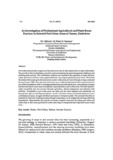Please use this identifier to cite or link to this item:
https://cris.library.msu.ac.zw//handle/11408/1830Full metadata record
| DC Field | Value | Language |
|---|---|---|
| dc.contributor.author | Mhindu, R.L. | - |
| dc.contributor.author | Wuta, M. | - |
| dc.contributor.author | Ngorima, E. | - |
| dc.date.accessioned | 2016-10-07T08:56:28Z | - |
| dc.date.available | 2016-10-07T08:56:28Z | - |
| dc.date.issued | 2015 | - |
| dc.identifier.issn | 1815-9036 | - |
| dc.identifier.uri | http://hdl.handle.net/11408/1830 | - |
| dc.description.abstract | Peri-urban areas are often caught up in the pressure for land as cities expand due too rapid urbanization. The growth of cities in developing countries is also accompanied by waste management challenges and declining food security. This combination of factors has resulted in the expansion of urban and peri-urban agriculture and also creates opportunities for recycling household and yard waste. We studied the characteristics and agricultural practices in peri-urban areas of Harare through surveys conducted during the year 2000. Key informant interviews were conducted and questionnaires administered to peri-urban households in order to investigate predominant agricultural practices, waste disposal strategies and the potential for waste reuse to beneficiate crop production in peri-urban areas. We noted that peri-urban households earn low incomes through agriculture, formal employment and informal trade activities. Households in peri-urban areas use refuse pits for waste disposal and periodically use decomposed refuse as a fertility amendment. Access to livestock manure is limited and farmers use a combination of refuse, inorganic fertilisers and manure to improve yields. We concluded that there is potential for improved recycling of wastes though composting so as to mitigate the shortage of fertility amendments. Opportunities also exist for increasing compost production by linking peri-urban and urban areas so that waste generated in urban areas may be transported and composted in peri-urban areas. | en_US |
| dc.language.iso | en | en_US |
| dc.publisher | Midlands State University | en_US |
| dc.relation.ispartofseries | The Dyke;Vol. 9, No. 1; p. 113-133 | - |
| dc.subject | Waste, Peri-Urban, Refuse, Income Sources | en_US |
| dc.title | An investigation of predominant agricultural and waste reuse practices in selected peri-urban areas of Harare, Zimbabwe | en_US |
| dc.type | Article | en_US |
| item.openairetype | Article | - |
| item.grantfulltext | open | - |
| item.openairecristype | http://purl.org/coar/resource_type/c_18cf | - |
| item.languageiso639-1 | en | - |
| item.fulltext | With Fulltext | - |
| item.cerifentitytype | Publications | - |
| Appears in Collections: | Research Papers | |
Files in This Item:
| File | Description | Size | Format | |
|---|---|---|---|---|
| periurban.pdf | Full Text | 10.21 MB | Adobe PDF |  View/Open |
Page view(s)
164
checked on Feb 6, 2026
Download(s)
94
checked on Feb 6, 2026
Google ScholarTM
Check
Items in MSUIR are protected by copyright, with all rights reserved, unless otherwise indicated.



